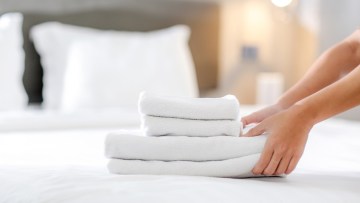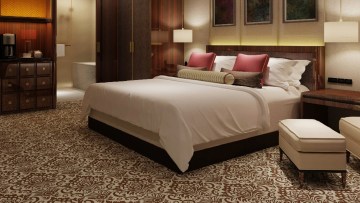Hotels
The wide range of facilities in hotels is particularly challenging when pests start to pose a health risk – rather than just being a nuisance . BASF pest control solutions address these problems and limit the cost of damage caused by rodents and insects.
Usual issues
Multiple environments at risk of pest infestations
Hotels consist of a range of different premises , including bedrooms, bar, restaurant and breakfast room, public areas, laundry, storage areas and offices. The combination of shelter, warmth, food and water is highly attractive for a number of different pests. Rodents and cockroaches are frequently found in kitchen and food stores, or near waste disposal units. Cockroaches also thrive in bathroom and kitchen drains. Ants and flies can be a nuisance in public areas and suggest a problem with cleanliness.

A worrying resurgence in bed bug infestations
Bed bugs were no longer considered a problem after World War II. However, a number of factors, including mass international travel and increasing resistance to insecticides have recently put them firmly back on the list of commonly found pests. Small independent hotels and large hotel chains are equally at risk of bed bug infestation. These pests may be introduced into the premises inadvertently, making prevention difficult. Bed bugs are particularly adept at hitching a ride on guests, staff members and laundry contractors and they can even travel in suitcases and hotel linen.
Impact / risks
Health risk for your guests and staff
Many pests are disease vectors. Rats and mice can, for instance, spread salmonella and listeria. Flies can transmit diseases by picking up harmful organisms from food waste. Cockroaches can also contaminate food and spread germs. Mosquito bites are itchy and unpleasant at the best of times. More worryingly, the recent arrival of Asian tiger mosquitoes in Europe is linked to the emergence or reappearance of some diseases such as chikungunya fever, dengue, malaria and West Nile fever. And bed bugs, while not disease vectors, they are a source of considerable psychological distress and many people affected by them suffer from insomnia.
Financial risk for your bottom line
Controlling a pest infestation can be a costly business. In a hotel, that might translate into closing bedrooms, or even floors in the case of a serious infestation, while they are being fumigated. The eradication of bed bugs may be particularly expensive as it usually results in bedding and soft furnishing being replaced.
Rats, mice and other insect vermin which have found their way into pantries also consume and contaminate stored food, which eats into your profits. Not to mention the structural damage they can inflict on the fabric of your premises.
The damage to your reputation is probably the largest pest-related cost. Unfavourable online reviews or simple rumours can spell disaster in the hotel business.
Legal risk for your business
Litigation is another hazard that can be linked to the presence of pests in hotels. Lawsuits, sometimes unfounded, mean that you have to spend time and money on solving a dispute.
If your establishment serves food, even if that’s just breakfast or room service, stringent food hygiene standards apply. Legislation intended to provide your staff with a safe and healthy environment also needs to be incorporated in your pest management strategy.
Benefits to use BASF products

Effective products with potent active ingredients
Pest control operators who specialise in multi-premise environments know which BASF products can be used in sensitive areas such as bedrooms, kitchens and public areas. They rely on active ingredients that are effective in low doses, minimising the quantities of product required to tackle an infestation.
Effective control for peace of mind
The comfort and health of guests and staff, the fabric of buildings and facilities, as well as the financial status of the business, can all be affected by the damage caused by pests. Hotel operators can count on BASF pest control solutions , as an important part of their maintenance programmes.


